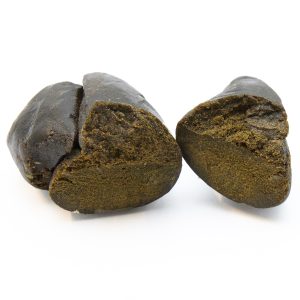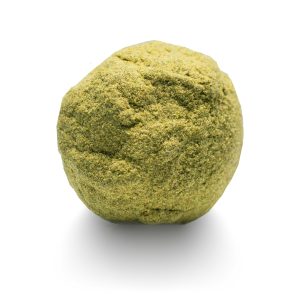Indice
The term hashish denotes one of the concentrated forms of cannabis. It is made from the resin of the flowers of the Cannabis sativa or Cannabis indica plant. Traditionally consumed for its powerful psychoactive effects, hashish arouses curiosity and interest because of its unique properties. This article explores the effects of hashish and their duration, examining different modes of use.
Read on to learn more!
Hashish effects
Hashish’s effects on the body and mind stem from its complex chemical composition, dominated by THC but enriched by the presence of other cannabinoids, such as CBD, as well as terpenes and flavonoids, which contribute to its unique profile. Thus, the effects of this form of concentrate reflect the complexity of cannabis as a medicinal and recreational plant. The variety of experiences and potential benefits underscores theimportance of an informed and responsible approach to its consumption. While research continues to unveil new aspects of hashish’s effects, understanding and respecting its powerful properties remains critical to harnessing its full potential safely and effectively.
Hashish psychoactive effects
The psychoactive effects of hashish, mainly due to the presence of THC, can vary widely depending on the dose, individual tolerance and the context in which it is consumed. Users may experience increased euphoria, altered perception of time and space, and increased sensory sensitivity that makes colors, sounds, and tastes more intense. This experience can facilitate a sense of connection and open-mindedness, pushing some toward creativity or deep personal reflections. However, high doses or particular sensitivity to THC can lead to less desirable effects, such as anxiety, paranoia or intense psychoactive experiences.
Hashish physical effects
On a physical level, hashish can act as a muscle relaxant, reducing tension and contributing to a general sense of bodily well-being. This relaxing effect can be especially beneficial for those suffering from conditions that cause chronic pain or muscle spasms. Some users also report a marked increase in appetite, commonly known as“munchies,” which can be helpful for patients struggling with loss of appetite due to illness or drug therapies. However, effects such as dizziness or drowsiness may be an inconvenience, especially in situations that require alertness or coordination.
Hashish therapeutic effects
Therapeutically, hash shows a wide range of potential, extending the benefits observed with cannabis use. Pain relief is perhaps the most sought-after effect, with THC acting on the nervous system to mitigate both acute and chronic pain. For patients dealing with anxiety and stress, hashish can offer a calming effect, helping to distance themselves from worrisome thoughts and promote mental relaxation. In addition, for those with insomnia or sleep disorders, hashish can facilitate falling asleep and improve sleep quality.
How long do the effects of hashish last?
The duration of the effects of hashish is a key aspect that influences the overall experience of its consumption. This varies significantly depending on the method of intake and other individual factors, offering different experiences depending on the consumer’s preferences and needs. Understanding the duration of the effects of hashish and the factors that influence it can help consumers make informed choices about the intake method that best suits their needs and expectations. Whether it is the quick relief desired from smoking or vaping, or the longer, more gradual experience offered by edibles, the key is responsible and conscious consumption.
Smoking or vaporization
Consuming hashish by smoking or vaping is the most direct method of experiencing its effects. In fact, smoking hashish makes its effects virtually immediate. This rapidity of action is due to theabsorption of cannabinoids through the lungs, which allows them to quickly reach the bloodstream and brain. As a result, effects can begin within minutes of inhalation. However, the duration of these effects is generally shorter than other methods of consumption, lasting from 1 to 3 hours. The speed of onset and relative brevity of effects make smoking or vaping popular choices for those seeking quick relief or a controlled experience.
Ingestion
Ingestion of hashish, especially in the form of edibles, has a markedly different effect profile. When consumed in this form, hashish must pass through the digestive system and be metabolized by the liver before its effects become apparent. This process takes longer, with the effects typically beginning to manifest between 30 minutes and 2 hours after ingestion. However, once the effects occur, they tend to be more prolonged and can last up to 6 hours or more. This extended duration is due to the slow release of cannabinoids into the bloodstream during the process of digestion and metabolism.
Factors influencing the duration of effects
In addition to the method of consumption, there are several other factors that can influence the duration of the effects of hashish, including:
- Individual tolerance: those who consume hashish regularly may develop a tolerance to its effects, potentially reducing the duration of its effects;
- Hashish potency: the concentration of THC and other cannabinoids in hashish can vary greatly, affecting the intensity and duration of the effects;
- Individual metabolism: differences in personal metabolism can affect the rate at which hash is processed and eliminated from the body, thus changing the duration of the effects.
Hashish effects: variability and tolerance
Variability and tolerance to the effects of hashish are key aspects in the experience of using this substance. These factors influence not only the perception of the effects, but also the choice of the most appropriate dosage and method of consumption for each individual. Understanding the variability and tolerance of the effects of hashish is essential for a responsible and satisfying consumption experience. In addition, knowledge of the potency and quality of the product can guide the choice regarding dosage and method of consumption, maximizing the desired benefits and minimizing potential unwanted effects.
Variability of effects
Individual reaction to hashish can vary widely due to multiple factors. Elements such as genetics, psychological context, health conditions, and even the environment in which hashish is consumed can profoundly influence the user’s experience.
Development of tolerance
With regular use of hashish, the body can develop a tolerance to cannabinoids. This means that over time, the same amounts of hashish may not produce as intense effects, prompting some users to increase doses to achieve desired levels of euphoria or relaxation. Tolerance develops at varying rates among individuals and may even decline with periods of abstinence, returning cannabinoid sensitivity to lower levels.
Power of hashish
The potency of hash, or the concentration of THC and other cannabinoids, is determined by the quality of the cannabis plant used and the extraction method employed. High-quality, THC-rich hashish will produce more intense and potentially longer-lasting effects than a less concentrated product. This aspect is crucial in choosing hash, especially for first-time users or those seeking specific effects, such as pain relief or anxiety.
Hashish long-term effects
The long-term effects of hashish use, as with other cannabis-derived products, can vary widely depending on several factors such as frequency of consumption, amount taken, potency of the product, and individual characteristics of the user. Here are some of the long-term effects commonly associated with hashish use:
- Addiction and tolerance: as mentioned earlier, regular use of hashish can lead to the development of tolerance. This means that over time it may be necessary to consume larger amounts of the substance to achieve the same effects. In some individuals, this can also lead to psychological dependence, characterized by a strong desire to continue using hashish despite the presence of negative consequences on personal, work or social life;
- Cognitive effects: research suggests that prolonged use of hashish may have negative effects on memory, attention and other cognitive functions. These effects may persist even after cessation of use, especially if consumption begins at a young age, during the period of brain development;
- Mental health: there is a correlation between frequent hashish use and an increased risk of developing mental disorders, such as anxiety, depression, and psychosis, especially in individuals with a genetic predisposition to such conditions;
- Respiratory health: like tobacco smoke, hash smoke contains chemicals that can irritate the respiratory tract and lungs. Prolonged use may increase the risk of respiratory problems such as bronchitis, and an increased risk of lung disease has been suggested in some studies, although the research is not conclusive:
- Reproductive health: some research suggests that regular hashish use may have effects on both male and female reproductive health, affecting factors such as sperm quality in men and menstrual cycle in women.
Difference effects legal hashish and illegal hashish
The main difference between legal and illegal hashish lies in the chemical composition, particularly in the levels of Tetrahydrocannabinol (THC), the main psychoactive compound in cannabis, and Cannabidiol (CBD), the cannabinoid best known for its therapeutic benefits. These differences directly influence the effects that hashish can have on the user.
Legal Hashish
Legal hashish tends to have a legally limited THC content, often below a certain percentage depending on local legislation. At the same time, the CBD content can be relatively high.
Because of the low THC content, legal hashish does not produce the intense psychoactive effects associated with high-THC hashish. Consumers, therefore, can experience a sense of relaxation and well-being without the typical “high.” CBD, present in higher amounts, can contribute to therapeutic effects, such as reducing anxiety, pain and inflammation.
Legal hash, being subjected to quality and safety controls, is free of contaminants such as pesticides or mold. This makes the product safer for consumption.
Illegal Hashish
Illicit hashish can vary significantly in composition. It often contains higher levels of THC, which can produce more intense psychoactive effects. The amount of CBD can be variable and is generally not a focus in production.
High levels of THC can lead to strong euphoria and altered perception . In addition, in some cases, it can cause anxiety or paranoia, especially in sensitive individuals or when consumed in large quantities. Lack of regulation can cause unpredictable effects due to fluctuations in power.
Without regulated production standards, illegal hashish may contain impurities or harmful substances. The lack of laboratory testing means that users have no assurance about the safety or exact composition of the product they are consuming.
Hashish effects: in conclusion
Hashish offers an intense experience, with effects ranging from psychophysical relaxation to deep personal reflections. However, it is important to approach its consumption with awareness, considering one’s health condition, context and the legality of its use in one’s region. As with any psychoactive substance, responsible and informed consumption is critical to ensuring a positive and safe experience.
If you are also passionate about legal hash and the cannabis world in general, we are waiting for you in our cannabis shop with many quality products and unmissable weekly offers!
FAQ
Yes, hashish can cause addiction. Regular and prolonged use of hashish can lead to the development of psychological and, in some cases, physical dependence. Addiction to hashish can manifest with withdrawal symptoms such as irritability, anxiety, sleep disturbances, and compulsive desire to consume the substance. The severity of addiction can vary from person to person and depend on several factors, including frequency and amount of use, individual sensitivity, and the presence of other mental health conditions. It is important to be aware of the potential risks associated with hashish use and to seek professional support if you are having difficulty controlling your use of the substance.
Yes, according to studies, hashish can cause side effects, which may vary from person to person and depend on the amount consumed, frequency of use and individual sensitivity. Some of the common side effects of hashish include:
- Dry mouth;
- Red eyes;
- Increased appetite;
- Memory disorders;
- Anxiety and paranoia;
- Coordination problems;
- Increased heart rate;
- Effects on the respiratory system.









